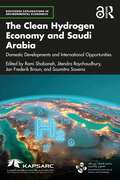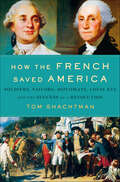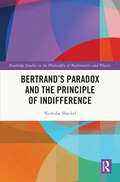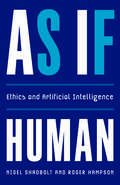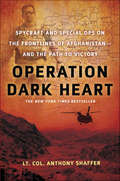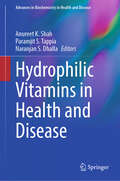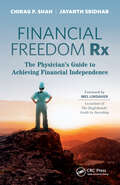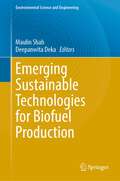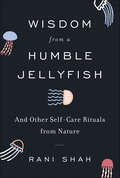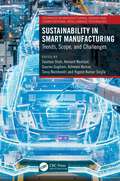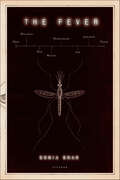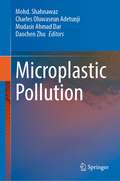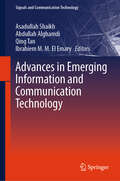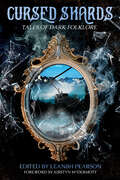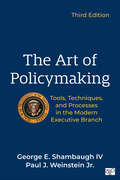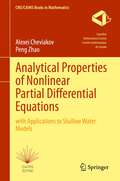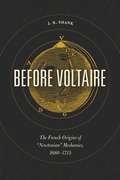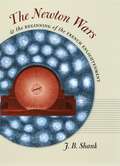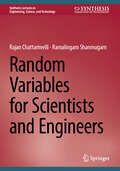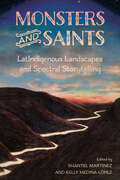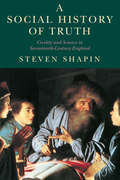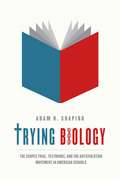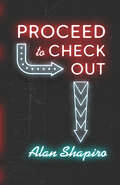- Table View
- List View
The Clean Hydrogen Economy and Saudi Arabia: Domestic Developments and International Opportunities (Routledge Explorations in Environmental Economics)
by Rami Shabaneh Jitendra Roychoudhury Jan Frederik Braun Saumitra SaxenaThis book provides a first-of-its-kind analysis of the emerging global hydrogen economy from the vantage point of one of the world’s biggest energy providers: Saudi Arabia. In 2021, and within the context of the Circular Carbon Economy framework, Saudi Arabia announced its goal to reach net-zero carbon emissions by 2060 and produce a substantial amount of clean hydrogen annually by 2030. The Kingdom is optimally situated geographically between the major demand markets in Europe and North Asia, from where it can leverage clean hydrogen exports as a potential tool to become a player of strategic importance and successfully diversify its economy under its Vision 2030 program. More broadly, the book charts a course for fossil fuel-exporting countries such as Saudi Arabia to carve a competitive position for themselves over the forthcoming decades using clean hydrogen as a catalyst for the energy transition.With contributions from global energy experts, the chapters in this book provide a multifaceted analysis of the "who," "what," "where," and "why" related to clean hydrogen development within and beyond Saudi Arabia. Collectively, the contributions analyze the countries and regions relevant to Saudi Arabia in terms of dedicated hydrogen policies, projects, and approaches that aim to incentivize production and demand in an increasingly carbon-constrained world. The book is a timely, unique and an indispensable resource for practitioners and students of energy, geopolitics, and climate policy working on hydrogen in academia, applied research, national government bodies, and international organizations.
Growing Your Vocabulary
by Shabo Magedah E.Students need to develop the skills to improve their vocabulary, not only because state standards require it, but because nothing will make students better readers and communicators than having the ability to understand new words. With over half a million of our vocabulary books in schools nationwide, Prestwick House has been well-known for years as the #1 source for the absolute best vocabulary programs. Now we're bringing our award-winning expertise to students in 4th-6th grade. The twenty lessons in each book are designed to get students actively thinking about how words are formed by using interesting notes on the vocabulary words' origins, definitions, and use in sentences. Each lesson has a full week's worth of activities and exercises that will help students not only remember the definitions of new words but also put what they have learned into practice through creative writing assignments and fun games. Every chapter also includes an exercise that will help students learn to experiment with language by building new words from known roots or breaking down unfamiliar words, giving them invaluable practice in using their newly acquired root word knowledge. Synonym and antonym usage is plentiful, and out hilarious cartoons will reinforce what students have learned. Recommended for sixth grade. This is a student classroom edition. Teacher's editions are available from the publisher but are only sold to teachers and schools.
How the French Saved America: Soldiers, Sailors, Diplomats, Louis XVI, and the Success of a Revolution
by Tom ShachtmanAmericans today have a love/hate relationship with France, but in How the French Saved America Tom Shachtman shows that without France, there might not be a United States of America.To the rebelling colonies, French assistance made the difference between looming defeat and eventual triumph. Even before the Declaration of Independence was issued, King Louis XVI and French foreign minister Vergennes were aiding the rebels. After the Declaration, that assistance broadened to include wages for our troops; guns, cannon, and ammunition; engineering expertise that enabled victories and prevented defeats; diplomatic recognition; safe havens for privateers; battlefield leadership by veteran officers; and the army and fleet that made possible the Franco-American victory at Yorktown. Nearly ten percent of those who fought and died for the American cause were French. Those who fought and survived, in addition to the well-known Lafayette and Rochambeau, include François de Fleury, who won a Congressional Medal for valor, Louis Duportail, who founded the Army Corps of Engineers, and Admiral de Grasse, whose sea victory sealed the fate of Yorktown. This illuminating narrative history vividly captures the outsize characters of our European brothers, their battlefield and diplomatic bonds and clashes with Americans, and the monumental role they played in America’s fight for independence and democracy.
Bertrand’s Paradox and the Principle of Indifference (Routledge Studies in the Philosophy of Mathematics and Physics)
by Nicholas ShackelEvents between which we have no epistemic reason to discriminate have equal epistemic probabilities. Bertrand’s chord paradox, however, appears to show this to be false, and thereby poses a general threat to probabilities for continuum sized state spaces. Articulating the nature of such spaces involves some deep mathematics and that is perhaps why the recent literature on Bertrand’s Paradox has been almost entirely from mathematicians and physicists, who have often deployed elegant mathematics of considerable sophistication. At the same time, the philosophy of probability has been left out. In particular, left out entirely are the philosophical ground of the principle of indifference, the nature of the principle itself, the stringent constraint this places on the mathematical representation of the principle needed for its application to continuum sized event spaces, and what these entail for rigour in developing the paradox itself. This book puts the philosophy and its entailments back in and in so doing casts a new light on the paradox, giving original analyses of the paradox, its possible solutions, the source of the paradox, the philosophical errors we make in attempting to solve it and what the paradox proves for the philosophy of probability. The book finishes with the author’s proposed solution—a solution in the spirit of Bertrand’s, indeed—in which an epistemic principle more general than the principle of indifference offers a principled restriction of the domain of the principle of indifference.Bertrand's Paradox and the Principle of Indifference will appeal to scholars and advanced students working in the philosophy of mathematics, epistemology, philosophy of science, probability theory and mathematical physics.
As If Human: Ethics and Artificial Intelligence
by Nigel Shadbolt Roger HampsonA new approach to the challenges surrounding artificial intelligence that argues for assessing AI actions as if they came from a human being Intelligent machines present us every day with urgent ethical challenges. Is the facial recognition software used by an agency fair? When algorithms determine questions of justice, finance, health, and defense, are the decisions proportionate, equitable, transparent, and accountable? How do we harness this extraordinary technology to empower rather than oppress? Despite increasingly sophisticated programming, artificial intelligences share none of our essential human characteristics—sentience, physical sensation, emotional responsiveness, versatile general intelligence. However, Nigel Shadbolt and Roger Hampson argue, if we assess AI decisions, products, and calls for action as if they came from a human being, we can avert a disastrous and amoral future. The authors go beyond the headlines about rampant robots to apply established moral principles in shaping our AI future. Their new framework constitutes a how-to for building a more ethical machine intelligence.
Operation Dark Heart: Spycraft and Special Ops on the Frontlines of Afghanistan—and the Path to Victory
by Anthony ShafferOperation Dark Heart tells the story of what really went on—and what went wrong—in Afghanistan. Lt. Col. Anthony Shaffer led a black-ops team on the forefront of the military efforts to block the Taliban's resurgence.For a moment he saw us winning the war. Then the military brass got involved. He witnessed firsthand the tipping point, when what seemed like certain victory turned into failure.This wasn't the first time he had seen bureaucracy stand in the way of national security. He had participated in Able Danger, the aborted intelligence operation that identified many of the future 9/11 terrorists but failed to pursue them. His attempt to reveal the truth to the 9/11 Commission would not go over well with the higher-ups.Operation Dark Heart made headlines when the Department of Defense bought the entire unredacted first printing. The book's revised second printing includes redactions, which, according to The New York Times, "offer a rare glimpse behind the bureaucratic veil that clocks information the government considers too important for public airing." But most importantly, Operation Dark Heart remains a stirring indictment against military bureaucracy and a culture of cover-ups.
Hydrophilic Vitamins in Health and Disease (Advances in Biochemistry in Health and Disease #29)
by Anureet K. Shah Paramjit S. Tappia Naranjan S. DhallaMore than 100 years ago, Dr Casimir Funk suggested the existence of a family of organic substances that are essential for life and thus introduced the concept of “vital amines” as essential nutrients with a specific action, requiring only minute amount with the power to cure a specific disease. Vitamins essential for human health are grouped according to whether they are soluble in water (hydrophilic) or in non-polar solvents (lipophilic). The hydrophilic vitamins are vitamin C and a series known as the vitamin B complex. Vitamin C is a reducing agent, whereas the vitamin B series are components of coenzymes. For example, riboflavin (vitamin B2) is a precursor of flavin adenine dinucleotide (FAD) and pantothenate (vitamin B5) is a component of coenzyme A. Indeed, several coenzymes contain a vitamin as part of their structure; this relation is undoubtedly responsible for creating an “essential” role for the vitamin. Since vitamins are involved in a wide range of biological processes and cell function, these are considered as essential nutrients. The essential nature of vitamins as well as their unique biochemistry, molecular mechanisms and cellular function in health and disease are emphasized in this book which will serve as a highly useful resource for health professionals, nutritional scientists, medical students, fellows, residents, and graduate students.
Financial Freedom Rx: The Physician’s Guide to Achieving Financial Independence
by Chirag Shah Jayanth Sridhar"The best physician-specific general financial book published in 2021." —James M. Dahle, MD, author of The White Coat InvestorA step-by-step guidebook for doctors and other medical professionals about growing and preserving wealth, Financial Freedom Rx: The Physician’s Guide to Achieving Financial Independence gives physicians all the tools necessary to manage their own finances and includes a foreword by Mel Lindauer, co-author of The Bogleheads' Guide to Investing. Medical professionals, especially doctors, spend many years in training as they accumulate debt and delay their earnings. This book presents a time-tested formula that students and established professionals can follow at any stage during their careers to achieve fiscal peace of mind. Students will learn how to budget and adopt disciplined financial practices. Residents and other trainees will learn how to defend against calamity with various insurances and how to manage debt. Junior professionals will acquire the skills needed to invest and grow their portfolios, while senior professionals will better understand the essentials of estate planning and retirement. Drs. Chirag P. Shah and Jayanth Sridhar wrote this inspiring text to guide physicians where to put their next dollar. This is particularly important during the financial uncertainties brought on by COVID-19 and insurance cuts. Financial Freedom Rx sets forth principles that will pilot medical professionals toward financial independence. Chapters include useful advice on topics such as: Financial planning Investing and asset allocation Jobs and contracts Taxes and insurance Student loans and debt Retirement savings and distributions Financial Freedom Rx: The Physician’s Guide to Achieving Financial Independence serves as a timeless blueprint for financial planning that medical professionals will follow throughout their careers, and as a reference that readers will revisit again and again as they progress through the various stages of life.
Emerging Sustainable Technologies for Biofuel Production (Environmental Science and Engineering)
by Maulin Shah Deepanwita DekaThis book is presented on biofuel production which includes different technologies developed and adopted to synthesize green renewable fuel alternatives for sustainable development. It also reflects different sources of biofuel, application of microbial community and microbial engineering to design fuel production and the biosynthetic pathways of biofuel production by microbes.Although the expenses for the physical and chemical technologies for energy production and fossil fuel utilization to protect our environment are very high, these technologies are not eco-friendly and safe. Hence, the need of certain modern eco-friendly and cost-effective techniques to protect our environment is deeply apprehended by different workers of this field. These techniques involve some feasible technologies utilizing different biological agents like microbes to produce renewable energy. This book provides an outline of the science behind the multidisciplinary aspects of biofuel production. It summarizes a solid foundation in the fundamentals and progresses to practical applications in this field. It structures stepwise route for a number of effective techniques to screen, select, identify and utilize microbes for biofuel production and utilization. It also focuses on the theoretical groundworks of biofuel production, recent technologies related to microbial engineering like myco-engineering technologies, microbial metabolism or modelling approaches to microbial physiology utilized for the same purpose. The techniques covered in this book ensure that scientists have the knowledge to practice effective biofuel production techniques themselves in a contaminated ecosystem in a sustainable way.Recent progress in the field of biofuels using microbial genetic engineering has larger perspectives in commercial-scale production. However, its large-scale production is still challenging; hence, to resolve this problem, it is essential to convert biomass into biofuels by developing novel technology to increase biofuel production to fulfil the current and future energy demand.
Wisdom from a Humble Jellyfish: And Other Self-Care Rituals from Nature
by Rani ShahA delightfully illustrated guide to harnessing the rhythms of nature for self-care.We could all learn a thing or two about living in balance from our friends in the plant and animal kingdom. Take, for example, the jellyfish, one of the most energy-efficient animals in the world, moving through the ocean by contracting and relaxing, with frequent breaks in between. Or the avocado tree, which can credit its existence to a mutually beneficial relationship with the pre-historic sloth, followed by some hungry, hungry humans and the advent of agriculture. And then there is the oyster, producing a pearl as the result of an immune response when a grain of sand invades her system. What better example exists of how adversity can produce something beautiful?We need look no farther than nature—from the habits of the porcupine to the sunflower to the wombat to the dragonfly—for small and simple things we can do to slow down, recharge, and living more thoughtfully, lovingly, and harmoniously.Wisdom From a Humble Jellyfish . . . is at once charming and scientific, packed with essential wisdom and practical tips worth borrowing from our plant and animal friends for life-changing self-care.
Sustainability in Smart Manufacturing: Trends, Scope, and Challenges (Advances in Manufacturing, Design and Computational Intelligence Techniques)
by Saumya Shah Hemant Nautiyal Gaurav Gugliani Ashwani Kumar Tanuj Namboodri Yogesh Kumar SinglaThis text highlights the role of artificial intelligence-powered robots and automation systems in revolutionizing digital manufacturing, covers prod-uct design and customization, and discusses various artificial intelligence algorithms for manufacturing processes and supply chain optimization. It further covers the applications of 3D printing and rapid prototyping for low-carbon development. Features:• Discusses microwave hybrid heating based on innovative joining tech-niques, applications of 3D printing, and rapid prototyping for low carbon development• Explains the role of artificial intelligence in digital manufacturing, data security, privacy issues, and defense mechanism• Provides an overview of artificial intelligence-powered robots and automation systems for revolutionizing digital manufacturing, and techniques for soft robotic structures• Presents case studies related to Six Sigma, digital manufacturing, and supply chain manufacturing• Explains artificial intelligence and machine learning-based high-predicted models for accurate data analysis in industry automationIt is primarily written for senior undergraduate, graduate students, and academic researchers in the fields of manufacturing engineering, industrial engineering, production engineering, mechanical engineering, and aerospace engineering.
The Fever: How Malaria Has Ruled Humankind for 500,000 Years
by Sonia ShahIn recent years, malaria has emerged as a cause célèbre for voguish philanthropists. Bill Gates, Bono, and Laura Bush are only a few of the personalities who have lent their names—and opened their pocketbooks—in hopes of curing the disease. Still, in a time when every emergent disease inspires waves of panic, why aren't we doing more to eradicate one of our oldest foes? And how does a parasitic disease that we've known how to prevent for more than a century still infect 500 million people every year, killing nearly 1 million of them?In The Fever, the journalist Sonia Shah sets out to answer these questions, delivering a timely, inquisitive chronicle of the illness and its influence on human lives. Through the centuries, she finds, we've invested our hopes in a panoply of drugs and technologies, and invariably those hopes have been dashed. From the settling of the New World to the construction of the Panama Canal, through wars and the advances of the Industrial Revolution, Shah tracks malaria's jagged ascent and the tragedies in its wake, revealing a parasite every bit as persistent as the insects that carry it. With distinguished prose and original reporting from Panama, Malawi, Cameroon, India, and elsewhere, The Fever captures the curiously fascinating, devastating history of this long-standing thorn in the side of humanity.
Microplastic Pollution
by Mohd. Shahnawaz Charles Oluwaseun Adetunji Mudasir Ahmad Dar Daochen ZhuThis edited volume covers cutting-edge research on different facets of microplastic pollution at the global level. The book describes different types of microplastics, their sources, transportation, extraction, identification, deleterious effects (on flora and fauna) and various mitigation measures. This book discusses recent advances in microplastic pollution and suggests future research directions to mitigate microplastic at the global level. It constitutes six important sections to report different facets of microplastic pollution. Section 1 deals with microplastic types, sources, uses and transport from land to aquatic environment; Section 2 reports detection, collections, extraction and identification of different types of microplastic from various polluting sites; Section 3 suggests cleaning drives for the removal of microplastic from the polluting sites; Section 4 highlights the impact of microplastic waste on flora and fauna in both terrestrial and aquatic environments; Section 5 enlists various microplastic degradation approaches to mitigate microplastic; and Section 6 discusses recent regulations/policies to minimize microplastic generation, followed by future research directions to mitigate microplastic pollution at global level. This book is of interest and useful to professionals working on microplastic mitigation, environment protection and waste management, NGOs and policymakers.
Advances in Emerging Information and Communication Technology (Signals and Communication Technology)
by Asadullah Shaikh Abdullah Alghamdi Qing Tan Ibrahiem M. M. El EmaryThe book presents the proceedings of the International Conference on Innovation of Emerging Communication and Information Technology (ICIEICT 2023), which took place September 11 to 13, 2023, virtually and in Madrid, Spain. The conference is devoted to communication, computer science, electrical and electronics engineering, telecommunication engineering, and information technology. The conference is intended to provide a forum for research scientists, engineers, educators, and practitioners throughout the world to learn, share knowledge, publish, and disseminate the most recent innovations and developments, ideas, and applications in all fields of science, technology and information technology.
Cursed Shards: Tales of Dark Folklore
by Leife Shallcross Clare Rhoden Nikky Lee Leanbh Pearson Louise Pieper Kirsten McDermott Mendel Mire K. B. Elijah McKenzie Richardson Amber M. Simpson Stephen HerczegBe careful what you wish for... We' ve all heard childhood fairy tales and hearthside stories passed from generation to generation warning us of unseen dangers lurking in the dark forest, the glimpse of a future in watery reflections and to be wary of objects and people offering impossible gifts. The Fae are ageless beings dwelling between light and shadow, stalking the moonlit nights and wielding powerful gifts and curses. Welcome to Cursed Shards, a collection of dark fantasy stories inspired by folklore, legends, fairy tales and mythology. Ten authors spin ten different tales ranging from deserts, icy mountains and dark forests to legendary warriors to the mythical Fae. A realm where the landscape is as volatile as the rulers and an ancient cursed mirror, a once-powerful magical artefact created with blood magic was shattered before it could be used against the realm. A cursed mirror broken but never destroyed. Ten shards remain: now disguised and repurposed into ordinary items that are traded, stolen, and sold between rulers, common folk and the Fae. Whenever a shard re-appears its curse influences the decisions of all who come within reach threatening Fae and mortal kingdoms alike.Here, the ancient adage ‘ be careful what you wish for' is true.
The Art of Policymaking: Tools, Techniques, and Processes in the Modern Executive Branch
by George Shambaugh Paul J. WeinsteinThe Art of Policymaking is the only book designed to provide students and practitioners with a detailed explanation of the specific tools, techniques, and processes used to create policy in the U.S., as well as the tools they need to understand them. The book includes practical advice on how to write memos, prepare polling questions, and navigate the clearance process. Case studies show how actual policies were developed and how and why policies and processes differed across administrations. And scenarios allow students to practice the tools and techniques they have learned by working through both domestic and foreign policy situations. Written by two experts in the field with experience in both academia and government, The Art of Policymaking is the perfect how-to guide for students and professionals.
The Art of Policymaking: Tools, Techniques, and Processes in the Modern Executive Branch
by George Shambaugh Paul J. WeinsteinThe Art of Policymaking is the only book designed to provide students and practitioners with a detailed explanation of the specific tools, techniques, and processes used to create policy in the U.S., as well as the tools they need to understand them. The book includes practical advice on how to write memos, prepare polling questions, and navigate the clearance process. Case studies show how actual policies were developed and how and why policies and processes differed across administrations. And scenarios allow students to practice the tools and techniques they have learned by working through both domestic and foreign policy situations. Written by two experts in the field with experience in both academia and government, The Art of Policymaking is the perfect how-to guide for students and professionals.
Analytical Properties of Nonlinear Partial Differential Equations: with Applications to Shallow Water Models (CMS/CAIMS Books in Mathematics #10)
by Shanghai Maritime University Alexei CheviakovNonlinear partial differential equations (PDE) are at the core of mathematical modeling. In the past decades and recent years, multiple analytical methods to study various aspects of the mathematical structure of nonlinear PDEs have been developed. Those aspects include C- and S-integrability, Lagrangian and Hamiltonian formulations, equivalence transformations, local and nonlocal symmetries, conservation laws, and more. Modern computational approaches and symbolic software can be employed to systematically derive and use such properties, and where possible, construct exact and approximate solutions of nonlinear equations. This book contains a consistent overview of multiple properties of nonlinear PDEs, their relations, computation algorithms, and a uniformly presented set of examples of application of these methods to specific PDEs. Examples include both well known nonlinear PDEs and less famous systems that arise in the context of shallow water waves and far beyond. The book will beof interest to researchers and graduate students in applied mathematics, physics, and engineering, and can be used as a basis for research, study, reference, and applications.
Before Voltaire: The French Origins of “Newtonian” Mechanics, 1680–1715
by J.B. ShankWe have grown accustomed to the idea that scientific theories are embedded in their place and time. But in the case of the development of mathematical physics in eighteenth-century France, the relationship was extremely close. In Before Voltaire, J.B. Shank shows that although the publication of Isaac Newton’s Principia in 1687 exerted strong influence, the development of calculus-based physics is better understood as an outcome that grew from French culture in general. Before Voltaire explores how Newton’s ideas made their way not just through the realm of French science, but into the larger world of society and culture of which Principia was an intertwined part. Shank also details a history of the beginnings of calculus-based mathematical physics that integrates it into the larger intellectual currents in France at the time, including the Battle of the Ancients and the Moderns, the emergence of wider audiences for science, and the role of the newly reorganized Royal Academy of Sciences. The resulting book offers an unprecedented cultural history of one the most important and influential elements of Enlightenment science.
The Newton Wars & the Beginning of the French Enlightenment
by J.B. ShankNothing is considered more natural than the connection between Isaac Newton’s science and the modernity that came into being during the eighteenth-century Enlightenment. Terms like “Newtonianism” are routinely taken as synonyms for “Enlightenment” and “modern” thought, yet the particular conjunction of these terms has a history full of accidents and contingencies. Modern physics, for example, was not the determined result of the rational unfolding of Newton’s scientific work in the eighteenth century, nor was the Enlightenment the natural and inevitable consequence of Newton’s eighteenth-century reception. Each of these outcomes, in fact, was a contingent event produced by the particular historical developments of the early eighteenth century. A comprehensive study of public culture, The Newton Wars and the Beginning of the French Enlightenment digsbelow the surface of the commonplace narratives that link Newton with Enlightenment thought to examine the actual historical changes that brought them together in eighteenth-century time and space. Drawing on the full range of early modern scientific sources, from studied scientific treatises and academic papers to book reviews, commentaries, and private correspondence, J. B. Shank challenges the widely accepted claim that Isaac Newton’s solitary genius is the reason for his iconic status as the father of modern physics and the philosophemovement.
Random Variables for Scientists and Engineers (Synthesis Lectures on Engineering, Science, and Technology)
by Ramalingam Shanmugam Rajan ChattamvelliThis book provides an introductory overview of random variables and their transformations. The authors approach the topic with statistics students in mind, along with researchers in various fields who are interested in data analysis. The book begins with by defining and explaining mathematical expectation. The authors then discuss transformations of random variables, including distribution functions and special functions. The book also covers joint probability distribution and its applications. The authors have updated and expanded upon their writing on these topics, which they originally covered in their previous book, Statistics for Scientists and Engineers.
Monsters and Saints: LatIndigenous Landscapes and Spectral Storytelling (Horror and Monstrosity Studies Series)
by Shantel Martinez and Kelly Medina-LópezContributions by Kathleen Alcalá, Sarah Amira de la Garza, Sarah De Los Santos Upton, Moises Gonzales, Luisa Fernanda Grijalva-Maza, Leandra Hinojosa Hernández, Spencer R. Herrera, Brenda Selena Lara, Susana Loza, Juan Pacheco Marcial, Amanda R. Martinez, Diana Isabel Martínez, Shantel Martinez, Diego Medina, Kelly Medina-López, Cathryn J. Merla-Watson, Arturo “Velaz” Muñoz, Eric Murillo, Saul Ramirez, Roxanna Ivonne Sanchez-Avila, ire’ne lara silva, Lizzeth Tecuatl Cuaxiloa, and Bianca Tonantzin Zamora Monsters and Saints: LatIndigenous Landscapes and Spectral Storytelling is a collection of stories, poetry, art, and essays divining the contemporary intersection of Latinx and Indigenous cultures from the American Southwest, Mexico, and Central and South America. To give voice to this complicated identity, this volume investigates how cultures of ghost storytelling foreground a sense of belonging and home in people from LatIndigenous landscapes. Monsters and Saints reflects intersectional and intergenerational understandings of lived experiences, bodies, and traumas as narrated through embodied hauntings. Contributions to this anthology represent a commitment to thoughtful inquiry into the ways storytelling assigns meaning through labels like monster, saint, and ghost, particularly as these unfold in the context of global migration. For many marginalized and displaced peoples, a sense of belonging is always haunted through historical exclusion from an original homespace. This exclusion further manifests as limited bodily autonomy. By locating the concept of “home” as beyond physical constructs, the volume argues that spectral stories and storytelling practices of LatIndigeneity (re)configure affective states and spaces of being, becoming, migrating, displacing, and belonging.
A Social History of Truth: Civility and Science in Seventeenth-Century England (Science and Its Conceptual Foundations series)
by Steven ShapinHow do we come to trust our knowledge of the world? What are the means by which we distinguish true from false accounts? Why do we credit one observational statement over another? In A Social History of Truth, Shapin engages these universal questions through an elegant recreation of a crucial period in the history of early modern science: the social world of gentlemen-philosophers in seventeenth-century England. Steven Shapin paints a vivid picture of the relations between gentlemanly culture and scientific practice. He argues that problems of credibility in science were practically solved through the codes and conventions of genteel conduct: trust, civility, honor, and integrity. These codes formed, and arguably still form, an important basis for securing reliable knowledge about the natural world. Shapin uses detailed historical narrative to argue about the establishment of factual knowledge both in science and in everyday practice. Accounts of the mores and manners of gentlemen-philosophers are used to illustrate Shapin's broad claim that trust is imperative for constituting every kind of knowledge. Knowledge-making is always a collective enterprise: people have to know whom to trust in order to know something about the natural world.
Trying Biology: The Scopes Trial, Textbooks, and the Antievolution Movement in American Schools
by Adam R. ShapiroIn Trying Biology, Adam R. Shapiro convincingly dispels many conventional assumptions about the 1925 Scopes “monkey” trial. Most view it as an event driven primarily by a conflict between science and religion. Countering this, Shapiro shows the importance of timing: the Scopes trial occurred at a crucial moment in the history of biology textbook publishing, education reform in Tennessee, and progressive school reform across the country. He places the trial in this broad context—alongside American Protestant antievolution sentiment—and in doing so sheds new light on the trial and the historical relationship of science and religion in America. For the first time we see how religious objections to evolution became a prevailing concern to the American textbook industry even before the Scopes trial began. Shapiro explores both the development of biology textbooks leading up to the trial and the ways in which the textbook industry created new books and presented them as “responses” to the trial. Today, the controversy continues over textbook warning labels, making Shapiro’s study—particularly as it plays out in one of America’s most famous trials—an original contribution to a timely discussion.
Proceed to Check Out (Phoenix Poets)
by Alan ShapiroAward-winning poet Alan Shapiro offers a new collection of poems reflecting on mortality and finitude. Alan Shapiro’s fourteenth collection of poetry, Proceed to Check Out, is a kind of summing up, or stock-taking, by an aging poet, of his precarious place in a world dominated by the ever-accelerating pace of technological innovation, political disruption, personal loss, and racial strife. These poems take on fundamental subjects—like the nature of time and consciousness and how or why we become who we are—but Shapiro presses them into becoming urgent and timely. Employing idiomatic range and formal variety, Shapiro’s poems move through recurring dreams, the coercions of childhood, and the mysterious connections of mind and matter, pleasure and memory. They meet an abiding need to find empathy and understanding in even the most challenging places—amid disaffection, public discord, and estrangement. His grasp of contemporary life—in all its insidious violence and beauty—is distinct, comprehensive, and profound.
